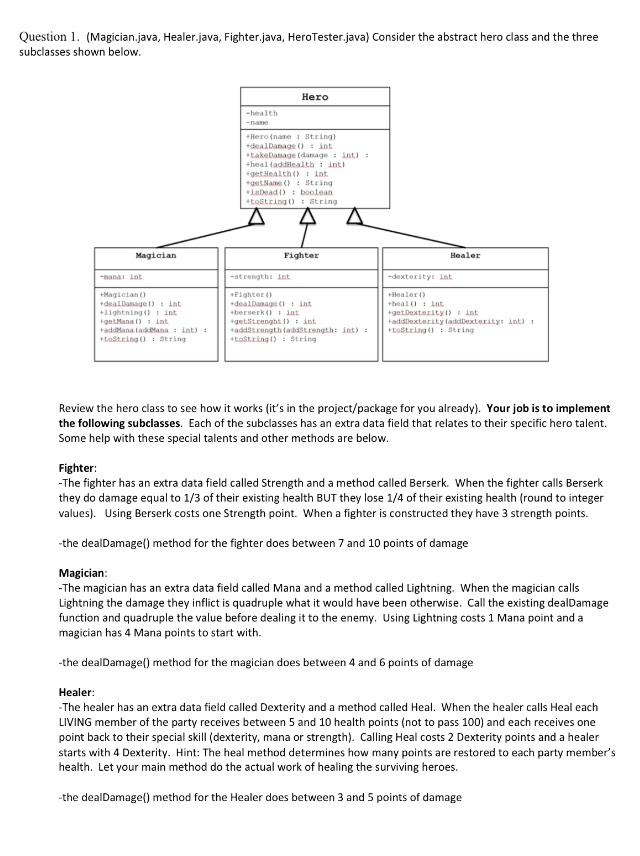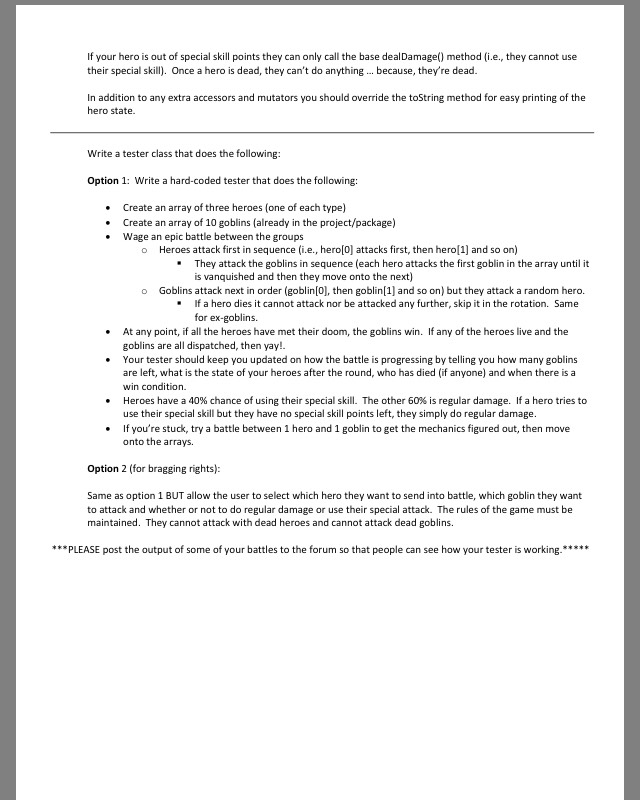

Question 1. (Magician.java, Healer.java, Fighter.java, HeroTester.java) Consider the abstract hero class and the three subclasses shown below Hero -health Hero (name 1 String) dea lDanage ) int takeDanage (danageint) heal laddlealth i int getHealth int Labead boolean Magician Fighter -dexteritys lst Healer get Dexterityiint manai nt -strengths Int dea lDanage iat +lightning() int Fighter ) dea1Danage .berserk() int int addstzength taddSt rength:int) ostringSering EoString1)String Lostring)SEring Review the hero class to see how it works (it's in the project/package for you already). Your job is to implement the following subclasses. Each of the subclasses has an extra data field that relates to their specific hero talent. Some help with these special alents and other methods are below Fighter: The fighter has an extra data field called Strength and a method called Berserk. When the fighter calls Berserk they do damage equal to 1/3 of their existing health BUT they lose 1/4 of their existing health (round to integer values). Using Berserk costs one Strength point. When a fighter is constructed they have 3 strength points. the dealDamage) method for the fighter does between 7 and 10 points of damage Magician The magician has an extra data field called Mana and a method caled Lightning. When the magician calls Lightning the damage they inflict is quadruple what it would have been otherwise. Call the existing dealDamage function and quadruple the value before dealing it to the enemy. Using Lightning costs 1 Mana point and a magician has 4 Mana points to start with. -the dealDamage() method for the magician does between 4 and 6 points of damage Healer The healer has an extra data field called Dexterity and a method called Heal. When the healer calls Heal each LIVING member of the party receives between 5 and 10 health points (not to pass 100) and each receives one point back to their special skil (dexterity, mana or strength). Calling Heal costs 2 Dexterity points and a healer starts with 4 Dexterity. Hint: The heal method determines how many points are restored to each party member's health. Let your main method do the actual work of healing the surviving heroes. the dealDamage() method for the Healer does between 3 and 5 points of damage If your hero is out of special skill points they can only call the base dealDamage() method (i.e., they cannot use their special skill. Once a hero is dead, they can't do anything.because, they're dead In addition to any extra accessors and mutators you should override the toString method for easy printing of the hero state. Write a tester class that does the following: Option 1: Write a hard-coded tester that does the following: Create an array of three heroes (one of each type) Create an array of 10 goblins (already in the project/package) Wage an epic battle between the groups . . o Heroes attack first in sequence (i.e., hero O attacks first, then hero[1 and so on) They attack the goblins in sequence (each hero attacks the first goblin in the array until it is vanquished and then they move onto the next) Goblins attack next in order (goblin[0], then goblin[1] and so on) but they attack a random hero. o If a hero dies it cannot attack nor be attacked any further, skip it in the rotation. Same for ex-goblins. At any point, if all the heroes have met their doom, the goblins win. If any of the heroes live and the goblins are all dispatched, then yay! Your tester should keep you updated on how the battle is progressing by telling you how many goblins are left, what is the state of your heroes after the round, who has died (if anyone) and when there is a win condition. Heroes have a 40% chance of using their special skill. The other 60% is regular damage. If a hero tries to use their special skill but they have no special skill points left, they simply do regular damage If you're stuck, try a battle between 1 hero and 1 goblin to get the mechanics figured out, then move onto the arrays. . * . Option 2 (for bragging rights): Same as option 1 BUT allow the user to select which hero they want to send into battle, which goblin they want to attack and whether or not to do regular damage or use their special attack. The rules of the game must be maintained. They cannot attack with dead heroes and cannot attack dead goblins. *PLEASE post the output of some of your battles to the forum so that people can see how your tester is working.** Question 1. (Magician.java, Healer.java, Fighter.java, HeroTester.java) Consider the abstract hero class and the three subclasses shown below Hero -health Hero (name 1 String) dea lDanage ) int takeDanage (danageint) heal laddlealth i int getHealth int Labead boolean Magician Fighter -dexteritys lst Healer get Dexterityiint manai nt -strengths Int dea lDanage iat +lightning() int Fighter ) dea1Danage .berserk() int int addstzength taddSt rength:int) ostringSering EoString1)String Lostring)SEring Review the hero class to see how it works (it's in the project/package for you already). Your job is to implement the following subclasses. Each of the subclasses has an extra data field that relates to their specific hero talent. Some help with these special alents and other methods are below Fighter: The fighter has an extra data field called Strength and a method called Berserk. When the fighter calls Berserk they do damage equal to 1/3 of their existing health BUT they lose 1/4 of their existing health (round to integer values). Using Berserk costs one Strength point. When a fighter is constructed they have 3 strength points. the dealDamage) method for the fighter does between 7 and 10 points of damage Magician The magician has an extra data field called Mana and a method caled Lightning. When the magician calls Lightning the damage they inflict is quadruple what it would have been otherwise. Call the existing dealDamage function and quadruple the value before dealing it to the enemy. Using Lightning costs 1 Mana point and a magician has 4 Mana points to start with. -the dealDamage() method for the magician does between 4 and 6 points of damage Healer The healer has an extra data field called Dexterity and a method called Heal. When the healer calls Heal each LIVING member of the party receives between 5 and 10 health points (not to pass 100) and each receives one point back to their special skil (dexterity, mana or strength). Calling Heal costs 2 Dexterity points and a healer starts with 4 Dexterity. Hint: The heal method determines how many points are restored to each party member's health. Let your main method do the actual work of healing the surviving heroes. the dealDamage() method for the Healer does between 3 and 5 points of damage If your hero is out of special skill points they can only call the base dealDamage() method (i.e., they cannot use their special skill. Once a hero is dead, they can't do anything.because, they're dead In addition to any extra accessors and mutators you should override the toString method for easy printing of the hero state. Write a tester class that does the following: Option 1: Write a hard-coded tester that does the following: Create an array of three heroes (one of each type) Create an array of 10 goblins (already in the project/package) Wage an epic battle between the groups . . o Heroes attack first in sequence (i.e., hero O attacks first, then hero[1 and so on) They attack the goblins in sequence (each hero attacks the first goblin in the array until it is vanquished and then they move onto the next) Goblins attack next in order (goblin[0], then goblin[1] and so on) but they attack a random hero. o If a hero dies it cannot attack nor be attacked any further, skip it in the rotation. Same for ex-goblins. At any point, if all the heroes have met their doom, the goblins win. If any of the heroes live and the goblins are all dispatched, then yay! Your tester should keep you updated on how the battle is progressing by telling you how many goblins are left, what is the state of your heroes after the round, who has died (if anyone) and when there is a win condition. Heroes have a 40% chance of using their special skill. The other 60% is regular damage. If a hero tries to use their special skill but they have no special skill points left, they simply do regular damage If you're stuck, try a battle between 1 hero and 1 goblin to get the mechanics figured out, then move onto the arrays. . * . Option 2 (for bragging rights): Same as option 1 BUT allow the user to select which hero they want to send into battle, which goblin they want to attack and whether or not to do regular damage or use their special attack. The rules of the game must be maintained. They cannot attack with dead heroes and cannot attack dead goblins. *PLEASE post the output of some of your battles to the forum so that people can see how your tester is working.**








